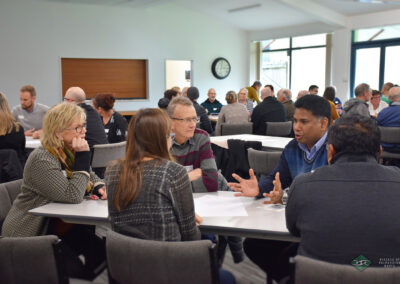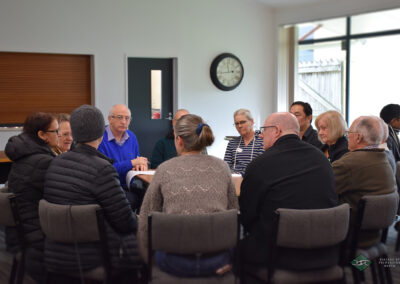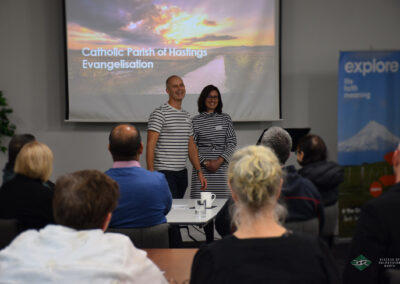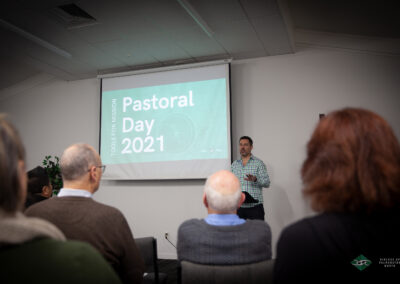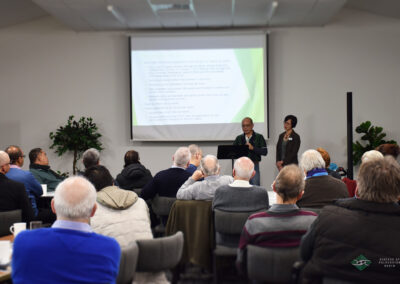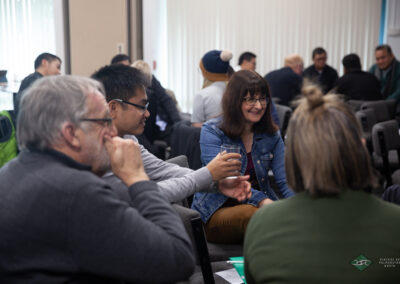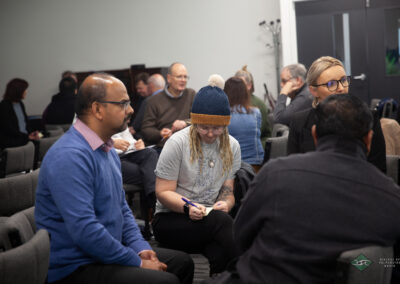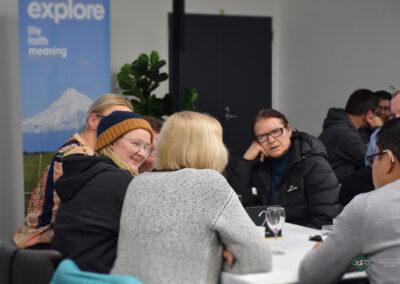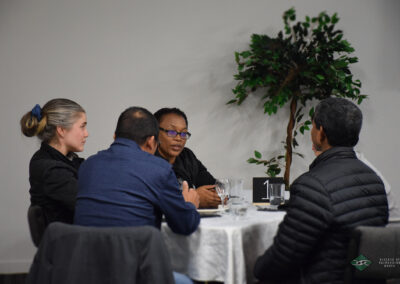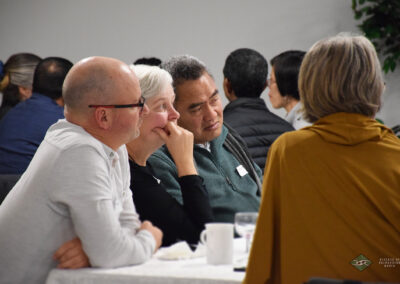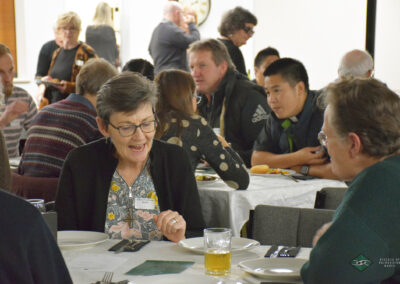Pope Francis is calling for us to be a church of missionary disciples.
This Pastoral Day was an opportunity for nominated lay leaders to gather with priests from across the Diocese of Palmerston North to explore how we might respond to this call.
Around 60 people came and explored a key tool for evangelisation (Alpha), met with others from around the Diocese and discovered more about their role in leading in their local community as we all respond to the Great Commission to ‘go and make disciples’.
Summary
Overview of the Experience
On Friday 18th and Saturday 19th June 2021, a group of leaders from across the Diocese of Palmerston North gathered to explore how we are being called to live as missionary disciples. The goal of the two days was to gather key leaders from across the diocese together to explore our mission. In the context of this mission, specifically one tool, the Alpha programme which has been used around the world and in some parts of our diocese, was the focus of presentations and discussions. These two days were hosted as Pastoral Days, which have been run in the Diocese of Palmerston North over the past few years usually for those in leadership or employment roles across our diocese, parishes and schools. This was the first time that volunteer lay leaders were nominated to attend part of the Pastoral Day and the Friday – Saturday programme reflected this adaption.
On the Friday, priests and diocesan staff were presented with some background and history of where the Church has been on mission in the past, along with an overview of Pope Francis’ process for forming Missionary Disciples by Fr Marcus Francis. They then heard from Isabella McCafferty about how some other diocese’s around the world have been responding to Pope Francis’ call and then linking in the focus on being a synodal church.
These two presentations were followed by a time of discussion. In the afternoon session, the focus shifted to the Alpha programme, which is a pre-evangelisation programme that assists with the process of forming Missionary Disciples. Fr Simon Story (Parish Priest of the Catholic Parish of New Plymouth) and Fr Trung Nguyen (Assistant Priest of the Catholic Parish of Hastings), both shared about their experiences with Alpha in their local context.
On Friday evening, around 40 lay leaders from across the diocese who had been nominated to attend by their parish priest, joined with the priests and diocesan staff at the Cathedral of the Holy Spirit in Palmerston North to continue exploring our mission and the Alpha programme. Following Mass, the group were given an opportunity to experience the key elements of an Alpha programme themselves including hospitality, a meal, video input and small group discussions.
The group returned on Saturday morning to continue exploring this tool, with lay leaders from the diocese who have been running Alpha in their parishes sharing their own experiences. Sean and Naomi Bell (Catholic Parish of Hastings) began the morning by relating the church to a vineyard and explaining how Alpha helps our communities to bear fruit. Albert and Christina Chow (Catholic Parish of New Plymouth) then followed this presentation, sharing some more of the specifics of Alpha and their own experience leading it in their community. Participants then gathered in regional groups and discussed how what they had experienced and heard might impact on their local community.
Some of the content
The exploration of our mission during this Pastoral Day was set in the context of our current realities as a church in Aotearoa. Some of the challenges and opportunities we are experiencing are outlined in this article, Roadmaps for Transformation, which is a summary of a series of presentations delivered across our diocese in 2020.
The foundational document that this Pastoral Day responds to include Pope Francis’ first Apostolic Exhortation, Evangelii Gaudium (2013). Many of Pope Francis’ most important documents, considered blueprints for his papacy, are heavily inspired by the key themes of the Aparecida Document or reference it extensively. This document is explored in more detail below.
What is the mission of the church?
The core of the mission comes from the Great Commission (Matt 28:19-20).
“Go therefore and make disciples of all nations, baptising them in the name of the Father, and of the Son and of the Holy Spirit, and teaching them to obey everything that I have commanded you.”
Jesus gave four tasks: go, make, baptise and teach.
During Pope Francis’ pontificate, it has become clear that Latin America can offer the rest of Church important lessons on how to keep faith alive and relevant in the face of changing social realities. Some of those lessons are easy to find, already spelled out in what is known as the Aparecida Document. This document has been has come to be seen as a road map the entire Church can use.
Aparecida Document (2007)
You can read the full document here.
The below ‘process for formation’ is taken from Chapter 6 of this document. The document refers to these the five fundamental aspects in the process of forming missionary disciples.
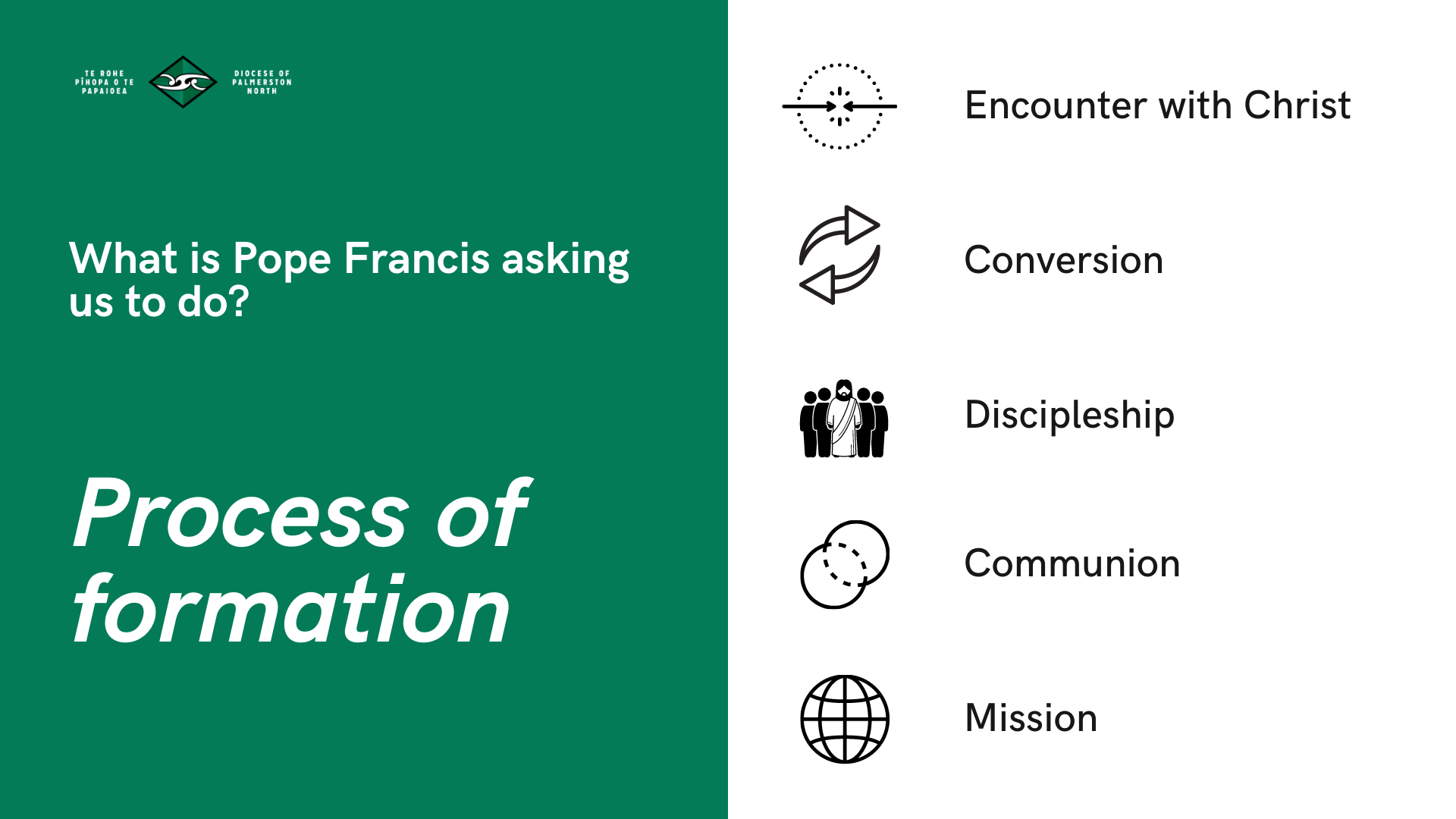
The five fundamental aspects in the process of forming missionary disciples are described in more detail below. The text for these is taken directly from the Aparecida Document.
Encounter with Christ
Those who will be his disciples are already seeking him (cf. Jn 1:38), but it is the Lord who calls them: “Follow me” (Mk 1:14; Mt 9:9). The deeper meaning of the search must be discovered, and the encounter with Christ that leads to Christian initiation must be fostered. This encounter must be constantly renewed by personal testimony, proclamation of the kerygma, and the missionary action of the community. The kerygma is not simply a stage, but the leitmotiv of a process that culminates in the maturity of the disciple of Jesus Christ.
Without the kerygma, the other aspects of this process are condemned to sterility, with hearts not truly converted to the Lord. Only out of the kerygma does the possibility of a true Christian initiation occur. Hence, the Church should have it present in all its actions.
Conversion
It is the initial response of those who have listened to the Lord in wonder, who believe in Him through the action of the Spirit, and who decide to be His friend and go with him, changing how they think and live, accepting the cross of Christ, conscious that dying to sin is attaining life. In Baptism and the Sacrament of Reconciliation Christ’s Redemption is actualized for us.
Discipleship
The person constantly matures in knowledge, love, and following of Jesus the master, and delves deeper into the mystery of His person, his example, and his teaching. Ongoing catechesis and sacramental life are of fundamental importance for this stage; they strengthen initial conversion, and enable missionary disciples to persevere in Christian life and mission in the midst of the world that challenges them.
Communion
There can be no Christian life except in community: in families, parishes, communities of consecrated life, base communities, other small communities, and movements. Like the early Christians who met in community, the disciples take part in the life of the Church, and in the encounter with brothers and sisters, living the love of Christ in solidarity, in fraternal life. They are also accompanied and encouraged by the community and its shepherds as they mature in the life of the Spirit.
Mission
As they get to know and love their Lord, disciples experience the need to share with others their joy at being sent, at going to the world to proclaim Jesus Christ, dead and risen, to make real the love and service in the person of the neediest, in short, to build the Kingdom of God. Mission is inseparable from discipleship, and hence it must not be understood as a stage subsequent to formation, although it is carried out in different ways, depending on one’s own vocation and on the moment in human and Christian maturation at which the person stands.
How are others responding to the call of Pope Francis?
Since Pope Francis was elected in 2013, the church has responded in different ways to his leadership. One of the noticeable changes has been the use of language and a clear focus on mission. Below are a few examples from Australia and New Zealand, where diocese’s have begun to respond to how Pope Francis is calling us to be as a church. The focus on becoming missionary disciples and reminder of our mission to go, make and baptise is clearly noticeable in these strategic plans and resources.
Exploring the Alpha Programme
Alpha is a programme that has been identified as a key tool as part being mission-focused parishes. It has been used in parishes all over the world and many have seen much fruit from what the programme facilitates.
What is most important is the process, not the programme itself. Alpha is focused on hospitality, inclusivity, high-quality resources and small group conversations. The video content itself is seen as a starting point for many people in their journey of faith, rather than substantial catechesis. It may be that there is an alternative programme that fits within this process that is more suitable to your audience. The process is also easily adaptable for other parish activities, for example Sacramental Programmes.
What is Alpha?
Alpha is a series of interactive sessions exploring the basics of the Christian faith.
Each session looks at a different question and is designed to create conversations. There’s no pressure, no follow-up and no charge; it’s just an open, informal, and honest space to explore and discuss life’s big questions together. Alpha is currently used as a key tool for evangelisation in many parishes.
Find out more about Alpha as a tool for evangelisation here.
Listen to some stories about Alpha and its impact on some Catholics and New Zealanders here.
Why is it a tool being used across Aotearoa & the world?
Parishes that run Alpha two or three times a year have found that it helps the parish to develop three essential missionary cultures for the long term:
Culture of Invitation and Hospitality
Alpha helps the parish to become an evangelising community. Those who have tried Alpha often want to share their experience with friends and invite them to the next course. The Alpha small groups model hospitality, which can permeate the entire life of the parish.
Culture of Encounter
Alpha helps the parish foster personal encounters and relationships with Jesus through the power and ministry of the Holy Spirit. Often this experience acts as an catalyst for people to grow as disciples. Through the simple model used on Alpha for prayer ministry, people learn how to pray for one another and it becomes a normal part of life in the parish. In addition they also begin to serve in other parish ministries.
Culture of Missionary Discipleship
Alpha engages lay people in the life and mission of the church. Often guests who have experienced Alpha go on to become effective and confident evangelisers as they share the impact that Jesus has had on their lives.
As part of this process of developing missionary disciples, Alpha enables a parish to establish a ‘leadership pipeline’. Some guests are invited to return to Alpha as helpers, then subsequently as hosts. This gives former guests the opportunity to engage in the mission of the church soon after experiencing Alpha.
Where has Alpha come from?
Alpha began at a church called Holy Trinity Brompton (HTB) in London in 1977, it was taken by Nicky Gumbel in 1990 and repositioned as a course for those outside the church. The number of people attending Alpha at HTB grew quickly into the hundreds and attracted the attention of other churches across denominations seeking to find an effective tool for evangelism.
Find out more about Alpha here: https://www.alpha.org/about/
Are there similar programmes available?
Yes, there are other programmes or content that can be used for similar gatherings.
One similar programme is called Sycamore, which has a more Catholic focus. Find out more here: https://www.sycamore.fm/
It is more about the process – not so much the specific programme.
There has been significant experience and success thus far using Alpha as a tool for evangelisation, which is why the focus of this Pastoral Day explored this programme, but you might want to explore another avenue.
How does Alpha link to what Pope Francis has been saying?
The Alpha programme is a tool that assists with the five fundamental aspects in the process of forming missionary disciples as described above.
Fr James Mallon (Divine Renovation) uses this quote from Evangelii Gaudium to suggest that Pope Francis would support the Alpha approach;
“All this demands on the part of the evangeliser certain attitudes which foster openness to the message: approachability, readiness for dialogue, patience, a warmth and welcome which is non-judgemenatal.” (EG, no. 165).
